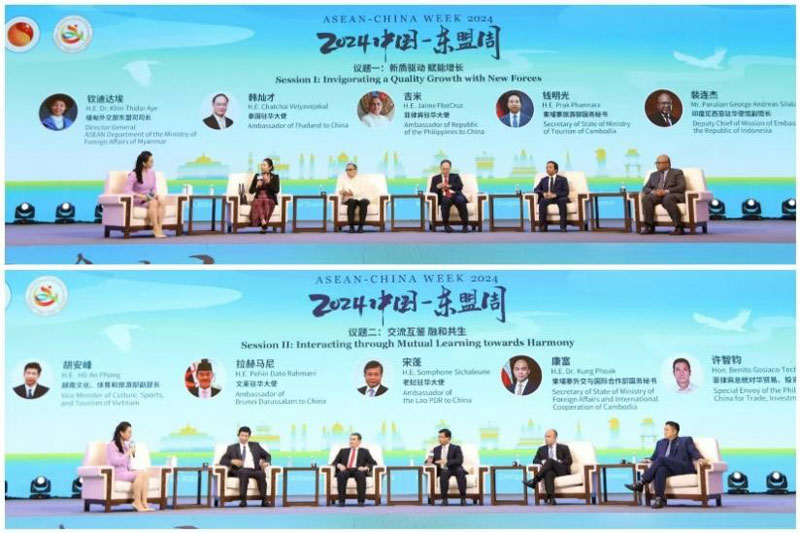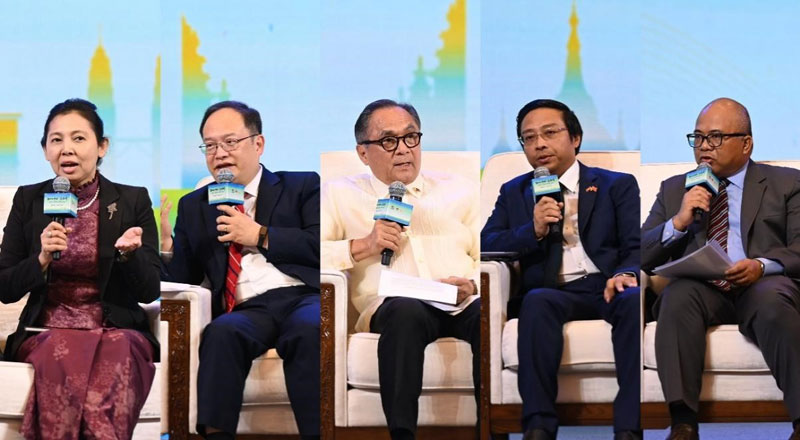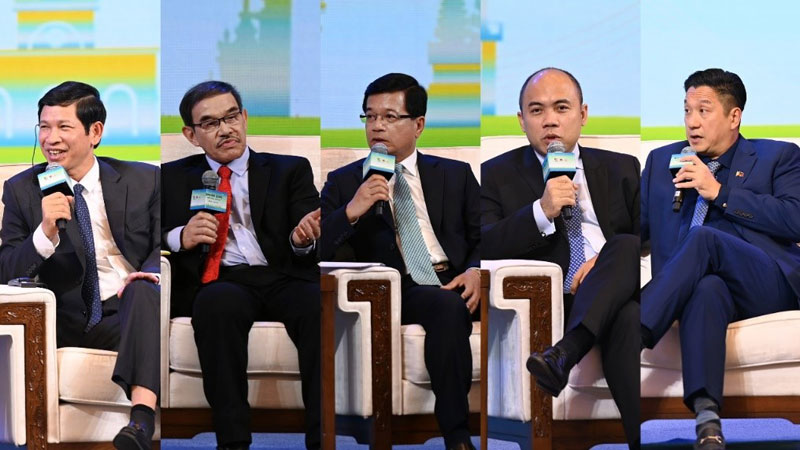
On 12 August 2024, the ASEAN-China Week 2024 witnessed its themed dialogue successfully staged in Changzhi of Shanxi Province. The dialogue titled “ASEAN-China Comprehensive Strategic Partnership: Achieving Prosperity through Innovation” brought together Ambassador Jaime of the Philippines to China, Ambassador Chatchai of Thailand to China, Secretary of State Prak Phannara of Ministry of Tourism of Cambodia, Director General Khin Thidar Aye of ASEAN Department of the Ministry of Foreign Affairs of Myanmar, Deputy Chief of Mission Parulian George Andreas Silalahi of the Indonesian Embassy in Beijing, Ambassador Somphone of the Lao PDR to China, Ambassador Rahmani of Brunei Darussalam to China, Secretary of State Kung Phoak of Ministry of Foreign Affairs and International Cooperation of Cambodia, Vice Minister Ho An Phong of Culture, Sports and Tourism of Vietnam, and Special Envoy Benito Gosiaco Techico of the Philippine President to China for Trade, Investment and Tourism. They had in-depth exchange of views on such topics as “invigorating a quality growth with new forces” and “interacting through mutual learning towards harmony”, and offered valuable advice on how to promote ASEAN-China high-quality development cooperation, enhance the outcome of people-to-people exchanges, and ensure a sound and steady growth of ASEAN-China Comprehensive Strategic Partnership.

In session one, Ambassador Jaime stated that scientific and technological innovation stays crucial to addressing global challenges such as climate change and promoting sustainable development. Cooperation between the Philippines and China in such areas as renewable energy meets the needs on both sides and enjoys a promising future. Both sides could explore more opportunities for cooperation in areas of solar energy development, new energy generation and NEVs.
Ambassador Chatchai highlighted the important role played by China in the green transformation of AMS and the implementation of the AMS Green Agenda. The AMS including Thailand are convinced that China’s development of new quality productive forces could provide ASEAN with a good opportunity to achieve high-quality development and sustainable growth. As the ASEAN coordinator for sustainable development, Thailand is implementing the vision called “Ignite Thailand” and stands ready to strengthen cooperation with other AMS and China in both technological innovation and artificial intelligence.
Prak Phannara stated that new quality productive forces play an important role in accelerating the post-pandemic global economic recovery and promoting shared development and prosperity. Cambodia is now promoting the sustainable development of tourism by leveraging green infrastructure, exploring new energy, promoting energy conservation and emission reduction, as well as developing the natural and cultural resources in a prudent manner. Looking ahead, Cambodia and China could promote and upgrade tourism cooperation with the empowerment of digital technology.
Khin Thidar Aye stressed that agriculture has always been the priority area of ASEAN-China cooperation. In the face of new circumstances and challenges, both ASEAN and China could conduct cooperation on agricultural technological research and innovation to increase the productivity, promote the agricultural mechanization and digitization, improve agro-ecological systems, enhance the resilience of food production and supply chains and jointly ensure regional food security.
DCM Parulian underlined that the Chinese path to modernization and industrial transformation have had far-reaching implications for the AMS, and China’s commitment to developing new quality productive forces would help AMS better integrate into the global industrial chain and supply chains. With digital economy reshaping global development, ASEAN-China cooperation on digital economy boasts enormous potential. ASEAN and China should strengthen the development of digital economy infrastructure to ensure that all stakeholders, including micro, small and medium-sized enterprises (MSMEs), can benefit from the booming digital economy, and meanwhile avoid risks and challenges in a digital era through strengthening cooperation in cyber regulation and governance of cyber platforms to ensure cyber security.

In session two, Ambassador Somphone stated that, since the launching of “Visit Laos Year 2024” at the end of 2023, the number of the Chinese tourists visiting Laos has been increasing with the visa-free policy put in place for China and the improvement of tourism services. The Laos will encourage more Lao people to travel to China, so as to promote the building of the Laos-China community with a shared future. Ambassador Rahmani stated that people-to-people exchanges are crucial to enhancing mutual understanding among the peoples of ASEAN countries and China, and both sides should further facilitate personnel exchanges by establishing more cooperative mechanisms in this aspect.
Kung Phoak stated that ASEAN-China friendship is rooted in sharing similar development philosophies and cultural values. Both ASEAN and China respect the diversity of civilizations, and advocate harmonious coexistence and dialogue among different civilizations on an equal footing, which ensures the booming development of ASEAN-China relations. Both sides should treat each other with sincerity and march forward hand in hand on the path to modernization through achieving common development.
Ho An Phong stressed that the friendship between Vietnam and China enjoys a time-honored history. Young generations on both sides should strengthen exchanges and enhance mutual understanding through events and activities in such fields as culture, sports and tourism to move forward Vietnam-China friendship. Benito Gosiaco Techico stated that both ASEAN and China should give full play to the role of media in managing public opinion and rooting out misunderstanding, and establish grassroot-level people-to-people exchange mechanism, so as to pool friendly forces for the sound development of ASEAN-China all-round cooperation.